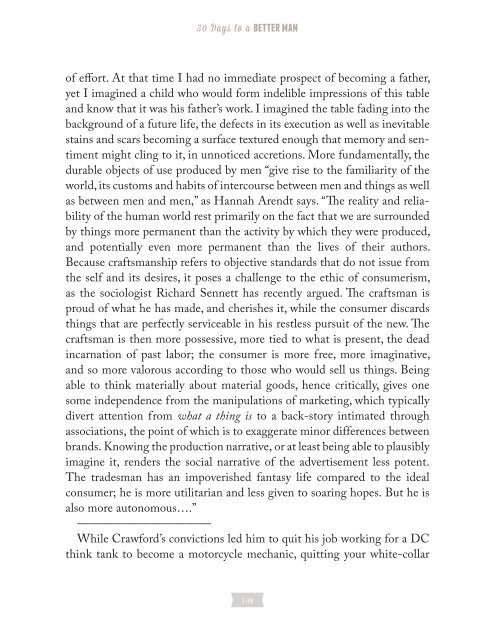6v87YgFhU
6v87YgFhU
6v87YgFhU
You also want an ePaper? Increase the reach of your titles
YUMPU automatically turns print PDFs into web optimized ePapers that Google loves.
30 Days to a better man<br />
of effort. At that time I had no immediate prospect of becoming a father,<br />
yet I imagined a child who would form indelible impressions of this table<br />
and know that it was his father’s work. I imagined the table fading into the<br />
background of a future life, the defects in its execution as well as inevitable<br />
stains and scars becoming a surface textured enough that memory and sentiment<br />
might cling to it, in unnoticed accretions. More fundamentally, the<br />
durable objects of use produced by men “give rise to the familiarity of the<br />
world, its customs and habits of intercourse between men and things as well<br />
as between men and men,” as Hannah Arendt says. “The reality and reliability<br />
of the human world rest primarily on the fact that we are surrounded<br />
by things more permanent than the activity by which they were produced,<br />
and potentially even more permanent than the lives of their authors.<br />
Because craftsmanship refers to objective standards that do not issue from<br />
the self and its desires, it poses a challenge to the ethic of consumerism,<br />
as the sociologist Richard Sennett has recently argued. The craftsman is<br />
proud of what he has made, and cherishes it, while the consumer discards<br />
things that are perfectly serviceable in his restless pursuit of the new. The<br />
craftsman is then more possessive, more tied to what is present, the dead<br />
incarnation of past labor; the consumer is more free, more imaginative,<br />
and so more valorous according to those who would sell us things. Being<br />
able to think materially about material goods, hence critically, gives one<br />
some independence from the manipulations of marketing, which typically<br />
divert attention from what a thing is to a back-story intimated through<br />
associations, the point of which is to exaggerate minor differences between<br />
brands. Knowing the production narrative, or at least being able to plausibly<br />
imagine it, renders the social narrative of the advertisement less potent.<br />
The tradesman has an impoverished fantasy life compared to the ideal<br />
consumer; he is more utilitarian and less given to soaring hopes. But he is<br />
also more autonomous….”<br />
———————————<br />
While Crawford’s convictions led him to quit his job working for a DC<br />
think tank to become a motorcycle mechanic, quitting your white-collar<br />
148


